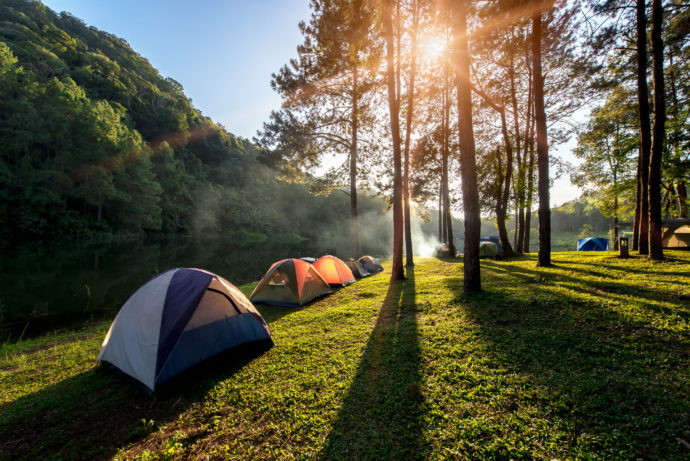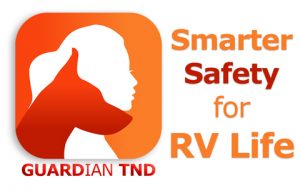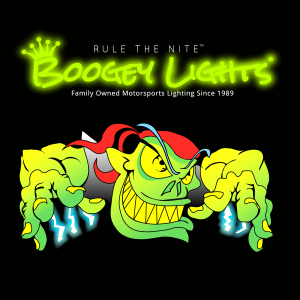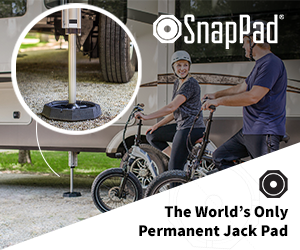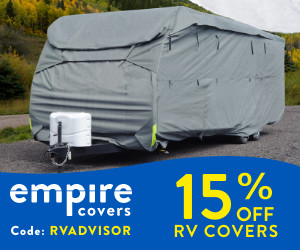The weather’s gorgeous, and camping is even better
As the temperature rises, people start to emerge from their homes like flowers pushing out of the soil. Both are embracing the warm weather, the sun, and the promise of life that abounds through the fertile months. More getaways are planned, more food is grilled, and more fun is had, worry-free of weather. But where people tend to go wrong is not planning properly. Mother Nature can still wreak havoc on your plans. Here are our tips for preparing for the unexpected.
Weather
We assume that because the weather is splendid where we live, it will be gorgeous where we camp. That’s not always the case, because the temperature varies depending on altitude. It’s always a good idea to pack extra blankets and a variety of clothes just in case the weather takes a turn.
Along with changes in the weather, we should plan for plenty of time in the sun. This means we will want to have an abundant supply of potable water nearby so that we can stay hydrated and replace the fluids that we lose.
Many people fail to plan, and they forget essential sun protection items like sunscreen. If you’re planning any length of time in the sun – and let’s face it, you’re camping so there will be plenty of sun – make sure you take along the right type of sunscreen to combat the negative effects of sun damage on your body.
Nights may be cold or hot, days may be scorching or overcast. There’s no real way for you to know what the weather will bring, so be sure to plan for all possibilities.
Bugs
Bugs. We hate them but can’t live without them. However, this doesn’t mean that you have to treat them as welcome guests in your camp.
You can reduce the chance of having issues with bugs by not camping near stagnant water, but you’re never going to find a completely bug-free location. This is where bug spray is your best friend. Go wild with it! Spray yourself, your campsite, the outside of your tent. This is one way you can deter bugs.
Another way is to make sure food is covered and take care of your trash, so it doesn’t build up and invite pests.
Consider the type of lighting you’re using. You can hang a bug zapper, but instead, consider using yellow or orange lights near your camp and white lights in the distance. White light will attract the bugs in greater numbers than yellow light will, so you can manage where the bugs linger at night.
Water
Swimming is a major pastime during the summer, but foreign water poses hidden dangers like currents that are waiting to grab you by the ankles and drag you downriver.
Depending on where you’re camping, it’s a good idea to know what kind of animals you may be exposed to while swimming. Research the area beforehand to help you determine your safety in the water. It’s important not to swim alone until you know where dangers lurk. You may also want to bring along life jackets to add a layer of protection in uncertain waters.
Many people also bathe in lakes and rivers, but that doesn’t mean it’s safe for the environment. While you may not think of it when you’re dipping your head underwater to rinse out all the shampoo, those chemicals are raising havoc with aquatic life.
If you’re planning a lengthy stay at a campsite and aren’t bringing a portable shower, be sure you invest in environmentally friendly soap and check to see if washing in bodies of water is prohibited where you’re staying.
Other considerations
What’s camping without a great campfire? When camping, the fire is your responsibility. One accident could lead to catastrophic events for local families and wildlife. Practice extreme caution when you’re camping with a fire. Make sure the fire is fully doused before going to bed or leaving your camp so accidental fires don’t ravage the campsite.
Also, remember to use firewood collected or bought locally. Bringing wood not local to the area can introduce foreign pests and diseases to local forests.
Finally, check fire safety where you’re camping. It’s very possible it’s been dry lately, and there could be a ban on starting a fire due to potential hazards.
Camping in different locations is definitely a perk for RVers. If you love exploring different campgrounds, then you’ll love the perks of being a member with the RV Advisor. Our members have access to advice on where the best campsites are as well as 10 percent off camping in KOA campsites!

